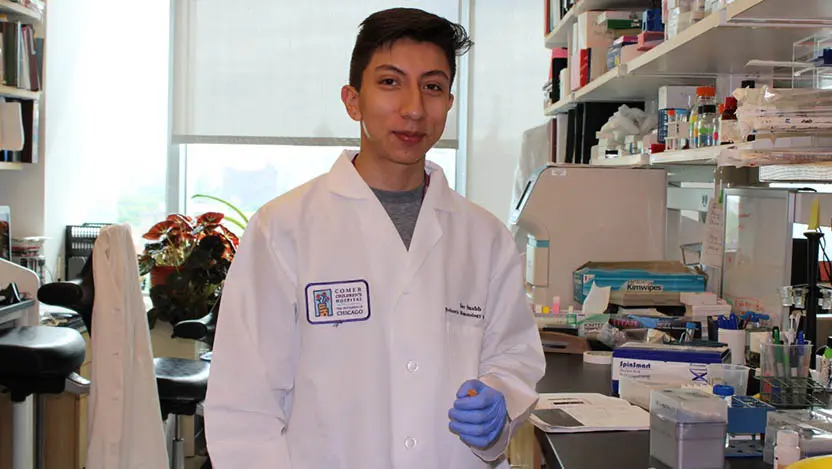Summer research programs: Creating life-changing experiences for high school and undergraduate students

When Ecuador-born Cristian Carpio joined a University of Chicago Medicine research training program for high school and college students, he said, "it was essentially a kind of experiment with myself."
“I don’t have any family in medicine or research or anything remotely in the world of academia."
As a teenager, he enjoyed science classes, "So I was like, 'Let’s see what this research and medicine thing is about.'"
The then-high schooler at Walter Peyton College Prep in Chicago applied to UChicago Medicine Comprehensive Cancer Center's Chicago EYES (Educators and Youth Enjoy Science) on Cancer program in 2019.
"Luckily, I got in. And then I was hooked," Carpio said.
The Chicago EYES cancer research training program provides real-time, hands-on experience to biomedicine-minded youths. For two consecutive summers, students work full-time in the laboratories of established cancer researchers at UChicago Medicine.
Rigorous research training is complemented with a cancer-based summer lecture series, year-round career development and skill-building workshops. A network of faculty and peer mentors are dedicated to participants’ success. Trainees' work is showcased in a symposium.
Part of what makes these programs great is that you get to work with such amazing and knowledgeable people.After completing the cancer research program, Carpio returned as an intern in Diversity in Cancer Research (DICR). The 10-week program is designed for undergraduates to expand their research experience.
“The science is what initially drew me to the programs, but they are so much more than that,” said Carpio, today a premed student at Northwestern University. “Just being in that space and putting on a lab coat was so powerful to me.”
From operating rooms to labs
The past two summers, Carpio has worked in a head and neck cancer lab co-led by Nishant Agrawal, MD and SHE in Oncology and researcHStart.For Carpio, who emigrated to the United States with his family when he was 3 years old, the programs have helped forge connections and given him the confidence to pursue a career in the medical field.
“I could talk for days about these programs,” he said. “As an immigrant from a low-income household, this world of academia was so foreign to me."
"The fact that I got exposure so early on without any connections in medicine or research is such a monumental thing. It sent me on the trajectory I am on today, and I don’t think I would be in medicine or even really know what cancer research is without these programs. It really has been life-changing.”

UChicago Medicine Comprehensive Cancer Center
UChicago Medicine is designated as a Comprehensive Cancer Center by the National Cancer Institute, the most prestigious recognition possible for a cancer institution. We have more than 200 physicians and scientists dedicated to defeating cancer.
Learn More About the Comprehensive Cancer Center